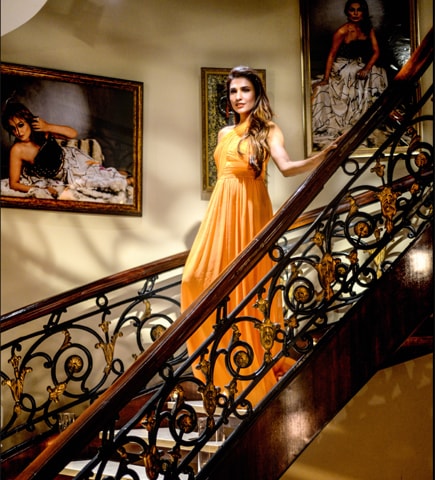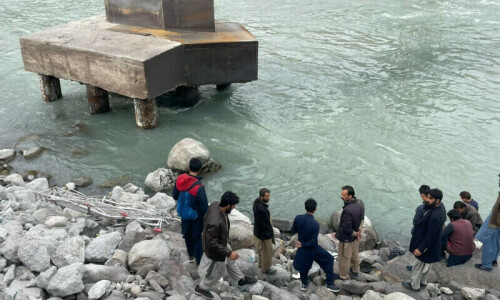
“People ask me when did I start thinking about this film and I answer, ‘I think, since I was five or seven years old’,” Saqib Malik tells me, as a waiter sets an unconventional iftar table at a Zamzama coffee shop. “It’s been in gestation for a really long time.”
The interview was scheduled by ARY Films, the distributors of Malik’s feature film debut Baaji, during the last days of Ramazan because the cast and the director would be in the middle of a mad promotional rush by the time of its release.
“It’s not by accident that I came into filmmaking,” Malik continues as slices of thin-crust pizzas, sauces, chicken and fish croquets, and dates (which now appear oddly out of place) are placed on what has become an overstuffed table.
As we talk and eat, Malik tells me that the kid in him is still enamoured by movies. The notion is quite apparent in the story he’s about to tell. Baaji is about an aging film actress Shameera (Meera), an aspiring young woman Neha (Amna Ilyas), a young-blood film director Rohail (Osman Khalid Butt) and an assorted set of supporting characters, in a film that pays homage to classic cinema, yet has a distinctive identity of itself.
For director Saqib Malik, Baaji is the sum of his life’s work and a turning point in his career, much like Meera who plays the title character in a film that imitates life …
“This is the perfect time to make this film,” Malik says. “Right now, we’re in the middle of the period of time that was, and a period of time that is.”
Seemingly, Baaji should be an intelligent piece of art imitating life, embellished in exaggerated commercial trappings. The film also serves as a cinematic extension — and self-catharsis — for Saqib Malik’s inner demons.

Malik’s 30-year career includes 600 commercials and acclaimed music videos such as Fuzon’s Khamaj — an ode to Guru Dutt and classic cinema — starring Shaan Shahid and Zara Sheikh.
“Baaji is a point of transition for me,” Malik goes on. “I’ll be turning 53. I’m in a mid-life crisis. I had to think about where my life was headed. I’ve been doing commercials for the last 30 years, and now I’m just done with them. For the last two years, I’ve been asking myself: what next, where do I want to go, am I still wanted in the world of advertising and commercials anymore? Am I that relevant? I’ve seen my peak, am I still there? So, in a way, it’s also my story.”
And in a way it is. Malik’s fingerprints are all over the place. There’s a bit of him in Shameera, the aging starlet who wants to break free and reinvigorate her image, in Neha, the young woman who is open to life’s opportunities, and the talented director who wants to give Pakistani audiences something different.
“This is the perfect time to make this film,” Saqib Malik says. “Right now, we’re in the middle of the period of time that was, and a period of time that is.”
“I see so much of myself in all the characters,” Malik says, attesting to my point. His screen avatars — Meera, Osman Khalid Butt and Amna Ilyas — are 20 feet away, separated by a sea of handpicked journalists and the very loud clatter and chatter of iftar.
“When I was writing the film, I thought there was just one person who could do this — and that was Meera. Baaji is not about Meera. It’s not a biopic. It’s an original fictional story,” Malik explicates. “Luckily, the character Meera plays is of somebody who is a film star. A lot of the baggage, a lot of that entrapment was already built into that character,” Malik elaborates as the table is cleaned up.
“By making a character for Meera, and making her relevant, I’m also doing the same for myself.” But it’s more than that, Malik stresses. “There is a meta-narrative to it. There is a lot of subtext about fame, success, ambition, about things that face us every day.”

Writing the film was a long, evolving process. He and screenwriter Irfan Ahmed Urfi tinkered with the screenplay throughout the production. Improvisations were being made even during the filming process.
“It was written on instinct. You shoot something, then realise it’s not working out. You take something out [and add something in]. Bohat saari cheezein apnay raastay banati hai [A lot of things make their own way] when you make a film,” Malik concludes, with the innate experience of a filmmaker who has just finished his first long-form narrative.
“Yes, there are inspirations from All About Eve and Sunset Boulevard. But All About Eve is about an actress and her understudy. Our film, when you see it, is very, very different. It’s not the first time you see something like this. Wall Street [had that same idea]. You have characters who aspire to be somebody.
“The Talented Mr. Ripley, Whatever Happened to Baby Jane, the Pakistani film Tehzeeb (1971). These films are a part of my consciousness [so there are bound to be influences],” he says as we realise that others are waiting to do their interviews; it has nearly been 50 minutes since we started talking.
About 20 minutes later, Amna Ilyas tells me of the dissimilarity of her character Neha from Rafina, the starry-eyed, ambitious young girl she played in Sabiha Sumar’s film, Good Morning Karachi.
“The similarity is just about the struggles they have,” Ilyas clarifies. “Neha has zero aspirations to become a model or an actress. She’s just out there to work and make money. Whatever life has to give her, she’ll take it. Inside, she’s not dark. She’s a happy person. [In comparison], Rafina always wanted to be an actress. [For example], there was this scene at the start of Good Morning Karachi, when she looked up at the billboard, she would imagine herself there. Neha isn’t like that.”
Ilyas, whose filmography includes Pakistan’s Oscar submission Zinda Bhaag and 7 Din Mohabbat In, appears to be a perfect fit in Baaji, though could she be type-cast for only playing complex and flawed characters, I ask.

“I’m not saying that I like to pick-up tootay huay [broken] characters. I just don’t like doing cliché roles. I like doing art films, off-beat stuff,” — though, Ilyas is quick to remind me that she did item numbers in Mehrunsia V Lub U and Dekh Magar Pyar Se.
During the course of our conversation, Ilyas also confirms the peculiar place and protocol Meera has in the film. “First, I would sit down with Saqib and we would go over the script. Then Meera would come in, and then the readings would start again, and we would change or improvise things.”
Even now, one sees the cast and the PR department making an extra effort to pamper and coddle Meera (the cast, in particular, shows genuine love and concern for the actress). Everyone’s actions were subtle, yet pronounced — as if they were making sure the bull got out of the china shop without knocking over a single piece of porcelain.
“If Meera would not have said yes to the project, then the project would not have happened,” Osman Khalid Butt tells me as we sit down.
“With a film like Baaji, I feel we had more material to play with. It’s a film that has so many stories to tell. It is art imitating life — as in Rohail finding the muse in Shameera, and Saqib finding a muse in Meera.”
OKB’s character Rohail is a Hollywood-trained director who, after hearing about the resurgence of Pakistani cinema, wants to add his name to the mix as well.”
“He’s a very focused, very measured man,” OKB elaborates. “He’s a man of few words, but everything he says carries weight. He’s very passionate about his film, and passionate about transforming Shameera’s character. In one of the scenes, Rohail wants Shameera in a completely deglamorised avatar [forcing her] to forget the commercial trappings and the tropes that one associates with [Lollywood] filmmaking. Every actor and actress has certain tricks up their sleeves, how they glance at somebody, portray anger. He wants her to forget all the education she received from all the films she has done, and completely shift her style of acting to something else.”
Art imitating life indeed.

“It is an honour for me that Saqib has chosen me for the role, for believing in me,” Meera tells me as we finally find a moment to talk. “No matter who would have played my character, Saqib Malik would still be making this film.” This is the first time we’re meeting and contrary to what most people advertise about her, her responses are quite eloquent.
“It is gracious of him to say that about me,” she replies when told of Malik’s insistence in crafting the narrative with Meera exclusively in mind. “We live in a country that does not have good filmmakers. People such as Saqib Malik are an ehsaan [blessing] on the industry. He could have made the film like this in Hollywood. It’s a far bigger industry.”
“Mai bohat pyasi thi [I was thirsting for the right role]. I wanted to make my comeback with the right filmmaker,” Meera continues in her uniquely dramatic manner.
“The blood that is coursing through me is indebted to films. The life that I have in me, is for films. I’m a very dedicated actress. Just like a cricketer will always be a cricketer. A politician will be a politician. An actress can only be an actress. My identity is cinema.
“Just like you strive to write a good article, or a good book, and you fail time and again,” she points to me, continuing. “I’ve failed many times. I was heartbroken. I cried, shrieked, screamed. I did not like anything. No amount of money, gold, silver, diamonds, jewellery, business class tickets or world travelling would satisfy me. I wanted to be happy by being a part of one good film.”
“Films kay ilawa mujhay kisi cheez ki samajh nahin hai [Other than films, I don’t know anything]. Kisi cheez ki nahin! [Nothing!]” She stresses the last line again for dramatic effect.
“This is my career-defining film. If I die now, I’ll die in peace.” Nobody can deny Meera’s gift for the theatrical. One assumes, however, that she would not want that peace without witnessing the critical acclaim this film may bring. Now that would certainly be a moment right out of classic cinema.
Published in Dawn, ICON, June 23rd, 2019












































